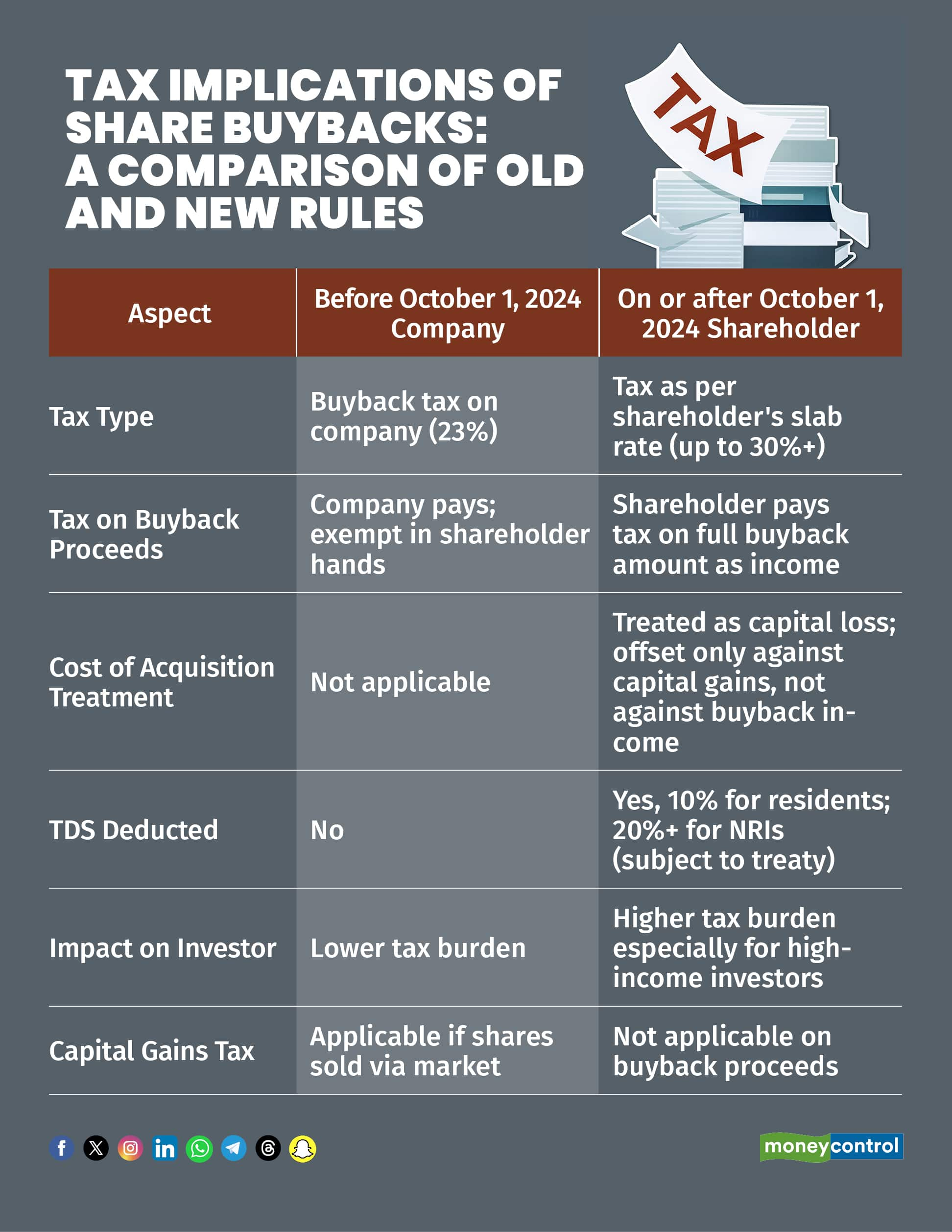



Infosys is in the process of a Rs18,000-crore share buyback, its biggest ever. India’s second largest IT services company plans to buy back from holders up to 10 crore shares, which is 2.41 percent of its paid-up capital, at Rs 1,800 apiece. The stock had closed at Rs 1,508.50 on September 15.
If you are an Infosys investor planning to tender your shares, tread cautiously. With new rules, tendering shares for a buyback means a bigger tax hit, especially for high earners.
We take a look at the tax implications for investors who participate in a share buyback.
Why do shareholders have to pay higher tax on buyback proceeds?The tax implications of a share buyback changed drastically last year. Under the latest tax rules, which came into effect on October 1, 2024, the amount received from a buyback is now taxable in the hands of shareholders as "deemed dividend" and is taxed as “income from other sources” at applicable rates.
For all buybacks conducted after October 1, companies do not pay any buyback tax instead, shareholders pay tax on the entire amount received from the buyback.
 Buyback tax implications on shareholders
Buyback tax implications on shareholders“The full buyback proceeds are considered as dividend income under Section 2(22)(f) and taxed at the shareholder’s slab rate, which can be as high as 30 percent+ for high-income individuals,” said Madhupam Krishna, a Securities and Exchange Board of India (Sebi) registered investment adviser (RIA) and chief planner, WealthWisher Financial Planner and Advisors.
Infosys buyback and what it means for investorsThe entire buyback amount received will be treated as income and taxed at your slab rate. Suppose you bought shares at Rs 1,000 each and the company is buying back at Rs 1,800. “The full Rs 1,800 per share you receive is counted as income and taxed accordingly. Your purchase cost of Rs 1,000 is treated separately as a capital loss, which you can offset only against capital gains in the future,” said B Srinivasan, director and founder, Shree Sidvin Investment Advisors.
For resident shareholders, TDS at 10 percent is deducted. For non-resident shareholders (including NRIs), TDS applies at 20 percent (plus surcharge and cess, or lower as per the relevant tax treaty).
The cost of acquisition of the bought-back shares cannot be deducted against buyback proceeds. However, this cost is treated as a notional capital loss and may be set-off against future capital gains according to prevalent guidelines.
“So, before October 1, 2024, the company paid a 20 percent (effective around 23 percent) as a buyback tax, and the shareholder’s buyback gain was exempt from tax. Now, the shareholder directly pays tax on the entire buyback proceeds, generally increasing the tax burden for those in higher tax brackets,” Krishna said.
If you sell shares on the exchange, you pay tax only on capital gains and also pay a securities transaction tax (STT). “For instance, if you bought shares at Rs 1,000 and sold them at Rs 1,800 in the market, you pay tax only on the Rs 800 gain. You also pay STT, which is a small percentage of the transaction. But in the buyback, you pay tax at slab rate on the entire Rs 1,800,” Srinivsan said.
The entire buyback amount received is treated as income and taxed at the investor’s slab rate, unlike normal sales where only capital gains are taxed with offset in the future, This results in a higher tax burden, discouraging investors from participating in buybacks .
“The new regime makes share buybacks less tax-efficient for high-tax-bracket shareholders, as buyback proceeds are taxed at their marginal rate instead of a flat rate at the company,” Krishna said.
Discover the latest Business News, Sensex, and Nifty updates. Obtain Personal Finance insights, tax queries, and expert opinions on Moneycontrol or download the Moneycontrol App to stay updated!
Find the best of Al News in one place, specially curated for you every weekend.
Stay on top of the latest tech trends and biggest startup news.